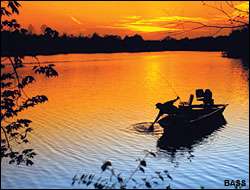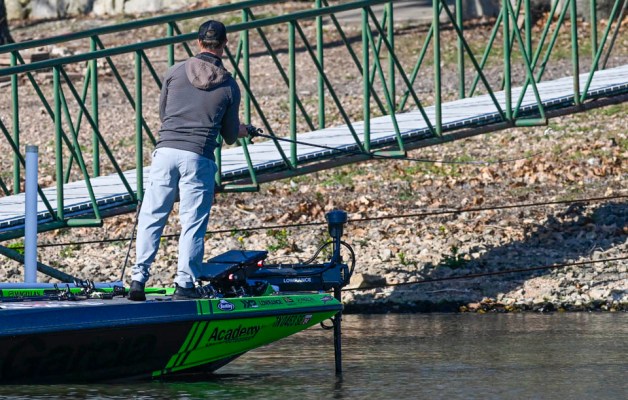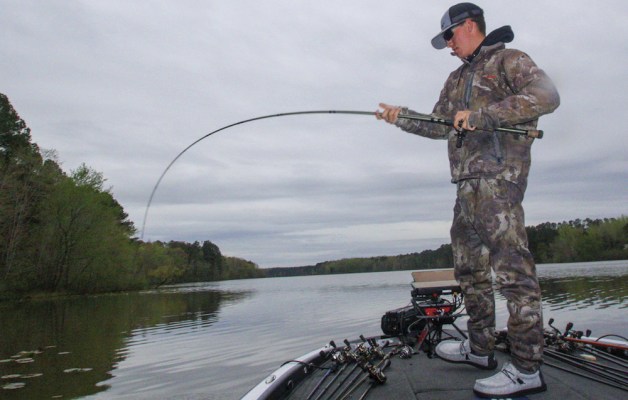
Anglers who take their fishing seriously — who expect and demand optimum results — prepare their bassing trips like a football coach boning up for a big opponent. They work on timing and perfect athletic execution to pick apart their adversary, targeting his weaknesses and taking advantage of every deficiency.
But unlike athletics, bass fishermen have the luxury of choosing their playing field. Bass may always have the home field advantage, but anglers can time their trips when the home team is the most vulnerable. In this respect, choosing when to fish a lake, pond, river or stream is like the long-experienced football coach who lines up an opponent schedule so adroitly that when he finally plays his toughest adversaries, his own team is so confident, functioning so perfectly as a well-timed unit, that they play beyond their individual abilities, and win in stunning fashion.
Every bass angler has a favorite lake or river, pond or stream. But the very best anglers have a lot of favorite waters. They pick among those premier places according to the season of the year, air and water temperature, up or down "cycle" in the bass population, water condition, bait availability, and many other factors.
These are anglers who have learned from experience that their livewells are more crowded at day's end if they make sure that their choice lake or pond, river or stream is in peak condition long before they launch their boats. They know that when they fish a given hot spot means as much to their success as where and how they fish it. This is why so many consistently successful anglers have a fishing schedule. It is an angling calendar as bulletproof as modern man can make it. They spend their precious fishing time only on the very best waters, and only during optimum fishing conditions.
It takes a lot of years and plenty of time for anglers to learn when they should be fishing which waters. But this is something any bass fisherman can do almost anywhere in America. The key is to think about your bass fishing — about the lakes and rivers you fish, their current conditions, and about the prime times you've experienced good fishing in the past. Don't leave such experiences to memory. Record them in a fishing log. Some anglers jot down on-the-water notes, which prove invaluable over time.
Be sure to record the best bass lures on different lakes, because if a buzzbait was deadly in the lily pads this spring on "Big Bass Lake," it's a good bet it'll work next spring in the lake's pads, too.
A growing number of anglers, including tournament fishermen Ken Cook, Rob Kilby and Rick Clunn, record information about bass lakes and reservoirs in a computer. These are money-making references for tournament fishermen when they return to a lake for an event. By checking notes about water levels, water clarity, air and water temperature, time of year, where, when and how past bass were caught, etc., these anglers are well ahead in the bass catching game.
But you don't have to be that sophisticated. Start a fishing log in a notebook or even with a small tape recorder. Tournament fisherman Shaw Grigsby uses a tiny recorder to make lake/river bass fishing notes. You don't have to be elaborate in your note taking, but be as specific as possible. List the exact dates and times you fish a spot, where, when and how you caught bass, the water temperature, air temperature, wind direction, current conditions, water clarity and level, and whatever else seems important.
It's a good idea to make a sketch of a spot — say, a cove or a small, submerged structure or weedbed — that yielded bass for you.
In 10 minutes, you can record a lot of important information about a bass fishing place. Do that every time you fish a lake or river, and in a very short time you'll have a valuable aid to help work out a remarkably effective schedule for bass fishing.
Well-known Florida bass angler Doug Hannon is one of the innovative anglers who journals pertinent details about his fishing hot spots. Hannon has used such recorded information for years in his fishing, and by referring to it frequently, it has helped him properly time his fishing trips.
"I've always kept a logbook, and I wouldn't turn loose of my logs for anything," says Hannon. "One of the hardest things is to start a logbook. It's like a good education — it's hard to see the value of it at first. But the farther you get with a logbook, the more it evolves into the most valuable source of information you have."
Another plus for keeping a bass fishing log, is it helps determine when fishing is peaking at other nearby lakes or rivers you may not know well.
For example, by checking fishing notes, you may learn that bass in a large reservoir are in shallows, looking for spawning flats in April. Prime conditions are warm, overcast weather, stable water levels and a light, south wind. This knowledge can help time a spring bass trip to a similar reservoir 100 miles to the south — just go a couple of weeks earlier than the prime time on your home reservoir.
Similarly, a clear, deep, spring fed lake farther north than the lake in your notes, should turn on for bass several weeks later.
Another important step in establishing a well-planned bass schedule is to obtain fishing advice and water condition information from lake or river areas. A great deal of such fishing information is available to all bass anglers, and they should actively use it in establishing seasonal bass fishing schedules.
Make friends with bait and tackle shop owners, with bass guides, fisheries department personnel, restaurant owners, newspaper outdoor writers, anyone who sees, hears or otherwise discovers what's going on in your favorite bass fishing region. These contacts greatly help in learning when to make a trip to a certain lake or river, and also when not to go.
A lot of bass anglers get into a fishing rut by only fishing one type of water, such as a large, clear reservoir or a big, deep river. To have a foolproof bass fishing schedule or calendar through the fishing seasons, an angler must have a wide variety of bass water available to him. Try to get a handle on large bass lakes and small ones; natural lakes and man-made waters; rivers, creeks, golf course ponds and borrow pits. Choose waters in as wide a geographic region as you can fish effectively, say a 200-mile radius of your home. If you're fortunate enough to live in an area that has several different bass species, that also can help you time trips to prime waters offering peak fishing.
Finally, never be shy about making a last minute change to your bassing schedule. You may be all set to head north for prespawn largemouth, but a sudden cold front that hits the night before the trip likely will send shallow water bass packing. A few late night phone calls, and a quick check of your logbook may help salvage your fishing time by changing directions — heading south, where the weather is warmer, water conditions more stable and bass eager to hit.




